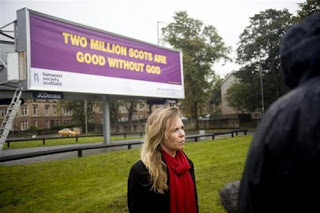When the Pope’s visit was announced some time ago, the HSS debated long and hard about how we should respond, and eventually decided that while we agree with all the arguments put forward by the Protest the Pope campaign, because of where we live and Scotland’s sectarian history, we’d have to do something different.
So last week we put up a poster in Glasgow, and launched a web site that attracted almost 20,000 hits on the day of the Pope’s visit to Scotland.
I and my colleagues on the Board of Trustees spent a large part of the week talking to the media from all over the world, and yesterday I wrote an article for the Sunday Mail that sums up what I wanted to say on the subject, but that you won’t find on the web because they don’t post everything they print. I hope you like it.
Before his visit to Scotland, the Pope was urged by his Scottish advisers to avoid making comments that could be seen as provocative. He obviously chose to ignore them, because he was hardly off the plane before he was attacking “aggressive secularism” and drawing unfortunate comparisons between atheists and the Nazis. You’d have thought that by his age, Pope Benedict would have learned that you don’t make friends and influence people by calling them nasty names.
The Humanist Society of Scotland didn’t burn any bibles, or stand on the streets shouting abuse; Scotland has a long and nasty tradition of sectarianism, and we deplore it, just as we deplore the Vatican’s stance on the rights of women, and gay people and its abject failure to deal with the long-running scandal of child abuse.
Instead, we put up a poster in Glasgow that points out, very politely, that at least 2 million Scots believe they are good without God. Or in other words, that 40% of the population think it’s perfectly possible to lead a good and worthwhile life guided by reason & compassion alone.
The Pope is confusing secularism – which means that people should have the freedom to practice their religion but be free from the domination of religion – with selfish materialism and consumerism. And as he’s an intellectual, I think it’s reasonable to believe that he’s using words like militant, and aggressive, and Nazi deliberately.
The pope’s trying to suggest that our liberal, democratic society lacks morality, but what he really wants is that religious people should be free to discriminate in areas like employment, and education rather than abide by the equality laws that protect the rights and freedoms of us all.
Actually secular societies are more moral than religious ones. Sweden, the most secular country in the world, gives the highest proportion of its gross domestic product in aid. Secularists don’t stone women to death for adultery, as they do in Iran, or murder people for teaching girls to read and write, as they do in Afghanistan, and I’ll be very surprised if we learn that the five Algerian men arrested in London on suspicion of plotting to assassinate him turn out to be secularists.
Why’s he attacking secularism? It’s simple: the pope’s rattled. Only 12% of the population is Catholic, and every time he opens his mouth, more and more people turn away from religion. In fact Pope Benedict is the poster boy for secularism.
And it’s ironic, because if our statistics are correct, 2010 is the year that humanist weddings in Scotland will become more popular than Catholic ones. What that means is that people are voting with their feet. More and more of them are thinking for themselves and identifying with humanist values.
You can visit the Good Without God web site here – please join our campaign, and remember when the 2011 census comes around, we’ll remind you to put a big tick in the “no religion” box.


"Pope Benedict is the poster boy for secularism" Excellent, great article Tim, a nice calm response to the Pope's secular critique! Adele
Bravo! And the poster boy comment will live in my memory for quite a while!